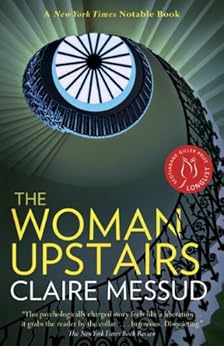As I mentioned on April 27, I’m featuring some reviews of books featuring nasty women. Today’s review is for The Woman Upstairs by Claire Messud.
3
Stars
Nora
Eldridge, an elementary school teacher and amateur artist, recounts the events
of five years earlier when she was 37 and experienced her “Shahid year.”
Disillusioned with how her life has turned out and feeling “unacknowledged and
unadmired and unthanked,” she lives a life “of quiet desperation” until the
Shahid family arrives from Paris. Reza shows up in her grade three class and
soon she meets his parents: Sirena, an artist gaining fame, and Skandar, a
visiting university professor. The three are glamorous and exotic and worldly,
all the things she has wanted for herself. Nora finds herself wanting “a full
and independent engagement with each of them” though a friend tells her she is
“in love with Sirena but want[s] to fuck her husband and steal her child.” She
soon shares a studio with Sirena, babysits Reza, and has long, philosophical conversations
with Skandar and through them gains a newfound interest in and engagement with
the world. But the three are in Massachusetts for only a year . . .
This is a
psychological portrait of the woman upstairs, “the quiet woman . . . who smiles
brightly in the stairwell with a cheerful greeting” but who “never makes a
sound” and so becomes “completely invisible.” “She’s reliable, and organized,
and she doesn’t cause any trouble.” She’s “so thoughtful of others” but “nobody
thinks of [her] first.” Nora describes herself as all of these, summarizing,
“I’m a good girl. I’m a nice girl. I’m a straight-A, strait-laced, good
daughter, good career girl.” In her art, Nora builds dioramas depicting sad,
lonely and tormented women like Emily Dickinson and Virginia Woolf; these
miniatures obviously reflect how Nora sees her own life.
Everything
changes when Nora meets Sirena who, in contrast, builds grand sculptural and
video-based installations. The problem, of course, is that it is other people
and someone else’s art which are responsible for Nora’s new vitality. Nora is
full of self-doubt and requires outside approval: “If nobody at all could or
would read in me the signs of worthiness – of artistic worth – then how could I
be said to possess them?” She convinces herself that Sirena and Skandar “could
convince me of my substance, of my genius, of the significance of my thoughts
and efforts.” She clarifies, “It’s not right to say that they made me think
more highly of myself; perhaps more accurately, that they allowed me to . . .
My lifelong secret certainty of specialness, my precious, hidden specialness,
was wakened and fed by them.”
A sense of
foreboding permeates the book because it soon becomes clear that her obsession
with the family is unhealthy, especially since her interpretation of Sirena and
Skandar’s words and actions may be based more on her needs and desires than on
reality. Early on, Nora says, “Life is about deciding what matters. It’s about
the fantasy that determines the reality.” This statement raises questions
especially when coupled with Nora’s quoting an Avril Lavigne song: “’You were
everything, everything that I wanted . . . All this time you were pretending.’”
Her descriptions of Sirena are particularly revealing: “If you’re really clever,
like Sirena, then you create a persona – or maybe, more disturbingly, you
become a person – who, while seeming impressively, convincingly to eschew
fakery, is in fact giving people, very consciously, exactly what they want.”
She even decides that a good definition of an artist is “a ruthless person.”
There is no doubt that something happens because she begins her story by
describing her fury: “How angry am I? You don’t want to know. Nobody wants to
know about that.” She ends on the same note: “My anger is prodigious. My anger
is colossus.” Much of the interest of the book is trying to guess what lead to
this “great boil of rage like the sun’s fire” when initially the year with the
Shahids is “paradisiac” and “blissful.”
Many of
Nora’s emotions and desires will resonate with readers. Unfortunately, I found
Nora’s self-absorption and neediness and tendency towards self-pity rather
pathetic. She goes on and on, page after page. In addition, sometimes she is
too willfully blind. For example, she is irked by her aunt: “It had always been
faintly effronting to me, the way Aunt Baby claimed our family lives as if they
were her own.” Yet she doesn’t see the irony of later interpreting Reza’s gift
of a smile “as if he were my own son.” Does confronting one’s mediocrity have
to be tedious?
I
appreciated the many literary allusions, both direct and indirect, and the
book’s examination of the theme of appearance/fantasy and reality, but Nora’s
journey of self-discovery about “the lies [she’d] persistently told [herself] these
many years” is not totally convincing.

No comments:
Post a Comment